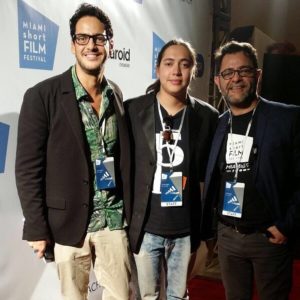The Unknown Sweet Potato Seller, directed by Ahmed Roshdy, with Khaled Abol Naga and Tara Emad.
Winner of Best Animated Film at the Miami Short Film Festival 2017.
Reviewed by Professor Robert Abrams, Professor of Old Age Psychiatry, Weill Cornell University
Mr Abol Naga, who plays himself as the film’s central character, is an important figure in the world of Arab cinema; he is well known as a prolific actor, filmmaker and human rights activist. He has also acted in numerous English-language films, and last season made his American television debut in FX’s Tyrant. In that series, Mr. Abol Naga plays a Sheikh (translated literally from the original Arabic to ‘priest’) who, as a candidate for the presidency of a fictional Middle Eastern country, promotes authentic Islamic values of tolerance, mercy, and respect for the individual.
The Unknown Sweet Potato Seller continues to focus on issues of social justice, or more accurately, social injustice. It ricochets forcibly into the consciousness of the viewer like the two bullets that kill an innocent 13-year-old boy in Tahrir Square. Unable to attend school because he was compelled to provide for his mother and sisters, Omar, the boy, had been a reluctant sweet potato vender who was simply in the wrong place at the wrong time—or so one would think. Khaled, as protagonist in this innovative animation, is moved, haunted and perplexed by Omar’s death. He is warned off his obsession by a worldly-wise friend, Rania, who tells him what he already knows, that he is utterly powerless, and that whatever led to the boy’s death is now a fait accompli that cannot be reversed. She reminds him of the futility of an individual standing up to power: ‘Before, when you cared, what changed?’ (This is perhaps a reference to the disappointing dénouement of the 2011 protests in Tahrir Square). Rania further cautions him about the risks to his own safety in seeking answers to this tragedy: ‘This has nothing to do with you,’ she insists.
But it has everything to do with Khaled. He is tormented, in fact anguished, by what he discovers had to have been a murder, since two shots could not possibly be accidental; soon enough the boundary between his waking life and the nightmare of Omar’s death vanishes. In a state of bereavement that verges on, but does not reach, psychosis, Khaled awakens to a series of terrifying images, then sets out to find the truth of what has occurred.
Why does one single tragedy, someone else’s at that, cause a person to identify with it so deeply? To grieve the loss as if it were his own? Not merely grieve, but stir him to rebellion? Recent history points to the astonishing power of a solitary event to seize control of the popular imagination and change the course of history; in this case, viewers will recall the protest of the fruit seller in Tunisia that set off the movement now known as the Arab Spring. It is certainly within the remit of human intelligence to exist simultaneously on two levels, the individual and the social. For most people, most of the time, the social conscience ‘receptors’ are dormant; yet one incident, only one shocking or appalling injustice in a sea of abuse, may speak loudly enough to spark a revolution.
Accordingly, The Unknown Sweet-Potato Seller creates a coherent nexus between social injustice and personal grief, between collective and individual consciousness. The elegant phrasing of the subtitles helps English-speaking viewers appreciate these connections, and the imaginative drawings of the animation beautifully highlight the changes in Khaled’s facial features and emotions as he investigates this terrible event and struggles to make known the unknown. For the few intense minutes of the film’s run we live his ordeal along with him. That is as it should be, since the death of an innocent child is really everyone’s nightmare.

Recommended listening
Listen to Khaled Abol Naga interviewed by Khalid Ali, film and media correspondent for Medical Humanities.